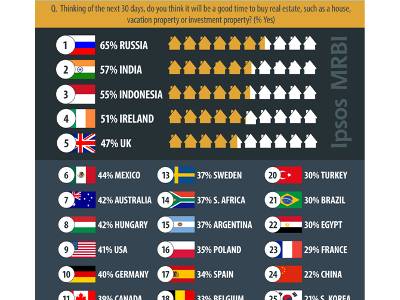45% of World Citizens Believe Immigration Has Had A Negative Impact on Their Country: Ipsos Study
Against a backdrop where eight in ten (80%) global citizens in the 23 countries polled believe that over the last five years the amount of migrants in their country has increased, half (52%) of all respondents also believe there are too many immigrants in their country, have made it more difficult for their country's people to get jobs (48%) and place too much pressure on their country's public services (51%).
Eight out of ten (83%) Indian citizen believe that over the last five years the amount of migrants in India has increased, however interestingly 43% of citizens polled believe that immigration has a positive impact on the country and 29% say it had negative impact.
The Ipsos poll of 17,601 adults also finds that those with the strongest opinion that immigration has generally been negative for their country are from Belgium (72%) followed by those from South Africa (70%), Russia (69%), Great Britain (64%), Turkey (57%), the United States (56%), Italy (56%) and Spain (55%).
Even those citizens who are most likely to believe immigration has generally had a positive impact on their country are in the lower range of opinion with India (43%), Canada (39%), Saudi Arabia (38%), Sweden (37%), Australia (31%), Brazil (30%) and Indonesia (30%) in ranked order.
Three in ten (29%) global citizens are clearly in the middle on the sentiment believing the impact is neither positive nor negative with those from Brazil (49%), South Korea (47%), Japan (46%) and Mexico (46%), Turkey (35%), Hungary (34%) and Argentina (32%) being the most neutral on the issue.
Globally, it would appear that education makes a big difference in terms of how citizens view the impact of immigration in their country: those with a higher level of education are significantly more likely to say that immigration has generally had a positive impact on their country (29%) than those with a lower education (16%) level. In this regard, it's more educated Canadians (60%) who are the most likely of all global citizens to say the impact of immigration has generally been positive for their country followed by their highly-educated counterparts in Australia (51%), Saudi Arabia (47%), Brazil (43%), India (43%), Sweden (39%) and the United States (32%).
A strong majority of global citizens (80%) are of the opinion that, "over the last five years, the amount of migrants in their country has increased'. This sentiment is held by a majority in each of the 23 countries surveyed by Ipsos. The citizens most likely to say so are from Belgium (94%), Italy (93%), South Africa (91%), Russia (90%), Argentina (89%), Great Britain (85%) and Spain (85%). Those least likely to say so are from Japan (56%), Germany (63%), Saudi Arabia (65%), Sweden (66%) and South Korea (75%).
Furthermore, half (52%) agree "there are too many immigrants in their country'. A quarter (25%) feel neutral on the topic while two in ten (19%) disagree. The countries most likely to agree are: Russia (77%), Belgium (72%), Great Britain (71%), Italy (67%), Spain (67%), South Africa (66%) and Argentina (61%). Those least likely to say so are from Japan (15%), South Korea (24%), Poland (29%), Indonesia (36%) and Mexico (37%).
According to the Ipsos study global citizens are not particularly laudatory when it comes to the perceived economic impact of immigrants on their own country: only 28% agree that immigration is good for their economy compared with a plurality (39%) who disagree and 29% who express neutrality on the topic. A majority of those living in Turkey (68%), Belgium (60%), Hungary (57%) and Russia (52%) are most likely to disagree that immigrants are positive for the economy of their country. Those most likely to agree that immigration is good for the economy in their country live in Brazil (47%), India (45%), Canada (43%), Saudi Arabia (41%) and Australia (36%).
While strong proportions say there are too many migrants and that they are bad for the economy, half (45%) agree that "priority should be given to immigrants with higher education and qualifications who can fill shortages among certain professions'. One third (27%) of participants disagree with this statement and one quarter (25%) are neutral. Those living in Canada (62%) are most likely to agree with this statement, followed by those in Australia (61%), Great Britain (58%), Saudi Arabia (58%), Russia (57%), South Africa (56%), Indonesia (55%) and India (51%). No country surveyed has a majority of citizens who disagree or are neutral on the issue.
Despite saying that those more professionally qualified should be prioritized for immigration, citizens still see migrants as threatening to their job security: half (48%) of those surveyed agree "immigrants in their country have made it more difficult for their country's people get jobs'. One quarter (25%) of global citizens disagree while another quarter (23%) neither agree nor disagree. The belief that immigrants make it harder for locals to get jobs is felt most acutely by three quarters (75%) of those living in Russia and a majority of those living in South Africa (64%), Great Britain (62%), Argentina (61%), Turkey (61%), the United States (60%) and Hungary (54%).
Immigrants are also seen to be a strain on public services: half (51%) of those surveyed agree "immigration has placed too much pressure on public services (such as health, transport and educational services) in their country'. Only two in ten (18%) disagree with this statement while one quarter (26%) are neutral. This view is felt most strongly among those in Great Britain (76%) followed by Spain (70%), Belgium (68%), the United States (66%), Australia (64%), South Africa (63%), Argentina (62%) and Hungary (59%).
Only three in ten (31%) global respondents agree that "immigrants make their country a more interesting place to live': a plurality (37%) disagree while another three in ten (28%) don't not have an opinion either way. In no country surveyed is there a majority that agrees with this statement; however, those most likely to agree live in Brazil (49%), Canada (48%), Australia (46%), India (46%), Sweden (44%), Indonesia (42%) and Saudi Arabia (40%).
The Ipsos survey instrument is conducted monthly in 23 countries via the Ipsos Online Panel system. The countries reporting herein are Argentina, Australia, Belgium, Brazil, Canada, France, Germany, Great Britain, Hungary, India, Indonesia, Italy, Japan, Mexico, Poland, Russia, Saudi Arabia, South Africa, South Korea, Spain, Sweden, Turkey and the United States of America. An international sample of 17,601 adults aged 18-64 in the US and Canada, and age 16-64 in all other countries, were interviewed between June 15 and June 28, 2011. Approximately 1000+ individuals participated on a country by country basis with the exception of Argentina, Indonesia, Mexico, Poland, Saudi Arabia, South Africa, South Korea, Sweden, Russia and Turkey, where each have a sample 500+. Weighting was then employed to balance demographics and ensure that the sample's composition reflects that of the adult population according to the most recent country Census data and to provide results intended to approximate the sample universe.
A survey with an unweighted probability sample of this size and a 100% response rate would have an estimated margin of error of +/-3.1 percentage points for a sample of 1,000 and an estimated margin of error of +/- 4.5 percentage points for a sample of 500 19 times out of 20 per country of what the results would have been had the entire population of the specifically aged adults in that country been polled.















Share
Facebook
YouTube
Tweet
Twitter
LinkedIn